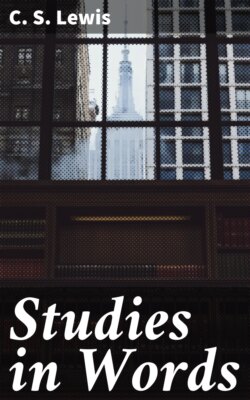Читать книгу Studies in Words - C. S. Lewis - Страница 10
На сайте Литреса книга снята с продажи.
VI. THE METHODOLOGICAL IDIOM
ОглавлениеTable of Contents
Suppose that a conversation which we overhear contains the remark ‘I’m afraid Jones’s psychology will be his undoing’. Most of us, I suppose, would take this to mean that the state of his psyche will endanger his success and happiness. But suppose we then discover that the conversation is between two examiners; that Jones is a candidate 20 in the examination; and that psychology is one of the three subjects in which he is being examined. The remark might now bear a different meaning—that Jones, having done fairly well on the other two subjects, had ruined his chances of the prize by his bad work on psychology. In other words, psychology is the name both of a science and of the things (or even one specimen of the things) which that science studies.
This transference I call the methodological idiom. It may produce ambiguity: ‘Freud’s psychology’ might mean either a subject of which we have all heard much or one which, some would say, has been examined too little. But ‘my anatomy’ would almost certainly mean those facts about me which an anatomist would speak of as an expert, rather than my theories or proficiency in his science. It would be difficult to explain the word physical if one ignored the methodological idiom. When Milton says in The Reason of Church Government[3] that the Psalms are better than Pindar and Callimachus ‘not in their divine argument alone but in the very critical art of composition’, critical art must surely, by this idiom, mean the art that critics expound; those who practice it are the poets. The curious expression ‘a scientific fact’ may originally have meant a fact that is literally scientific or ‘science-making’—a key fact whose discovery makes possible a wide range of further discoveries. But most modern users, I believe, mean merely ‘a fact of the sort that scientists know about’. The methodological idiom, applied to history, has produced some confusion. It is 21 often hard to be sure whether the word means the past events themselves as they really were or the study that tries to discover and understand them.
